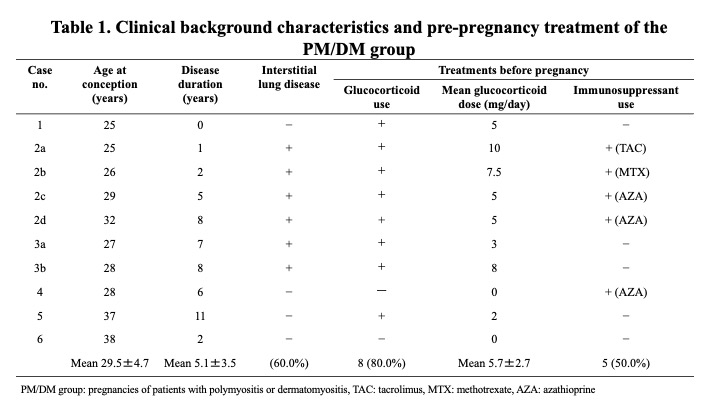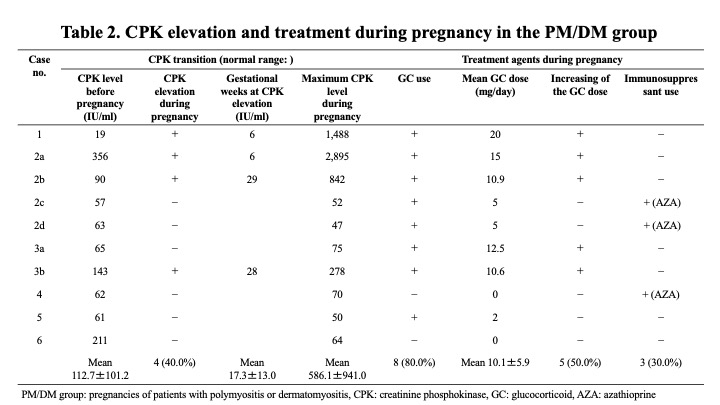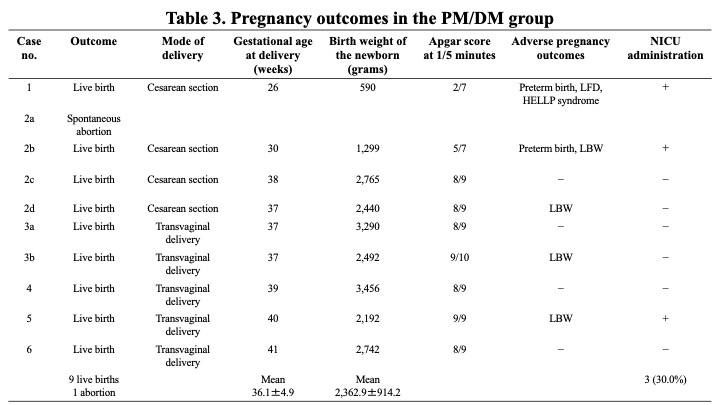Back
Poster Session B
Reproductive health
Session: (0939–0969) Reproductive Issues in Rheumatic Disorders Poster
0952: Pregnancy Course and Outcomes of Patients with Polymyositis and Dermatomyositis (PM/DM) in Our Institution
Sunday, November 13, 2022
9:00 AM – 10:30 AM Eastern Time
Location: Virtual Poster Hall
- RM
Rina Mino, MD
Kagawa University, Division of Hematology, Rheumatology and Respiratory Medicine, Department of Internal Medicine, Faculty of Medicine
Miki-cho, Kita-gun, Japan
Abstract Poster Presenter(s)
Rina Mino1, Hiromi Shimada2, Risa Wakiya2, shusaku nakashima3, Mikiya Kato2, taichi miyagi4, Yusuke Ushio5, Kanako Chujo6, Tomohiro Kameda2 and Hiroaki Dobashi7, 1Kagawa University, Division of Hematology, Rheumatology and Respiratory Medicine, Department of Internal Medicine, Faculty of Medicine, Miki-cho, Kita-gun, Japan, 2Kagawa University, Kagawa, Japan, 3Division of Hematology, Rheumatology and Respiratory Medicine, Department of Internal Medicine, Faculty of Medicine, Kagawa, Japan, 4Kagawa University, Kidagun, Japan, 5Division of Hematology, Rheumatology and Respiratory Medicine, Department of Internal Medicine, Faculty of Medicine, Kagawa University, Miki, Kita District, Kagawa, Japan, 6Kagawa University, Miki, Kita District, Kagawa, Japan, 7Division of Hematology, Rheumatology and Respiratory Medicine, Department of Internal Medicine, Faculty of Medicine, Kagawa, Kagawa, Japan
Background/Purpose: The purpose of this study is to determine the association between changes in disease activity during pregnancy and pregnancy outcome by analyzing a case series of polymyositis and dermatomyositis (PM/DM) complicated pregnancies in a single center.
Methods: PM/DM patients who were managed from pregnancy to delivery at Kagawa University Hospital from March 2006 to May 2022 were included in this study by using rheumatic disease patient pregnancy registry. We collected the data from medical record, and retrospectively evaluated the association between disease activity during pregnancy and pregnancy outcomes.
Results: Mean age at delivery was 29.5±4.7 years old, and mean disease duration was 5.1±3.5 years. Glucocorticoid (GC) was administered in eight cases, and mean dose of GC was 10.1±5.9 mg/day. We needed to increase GC dose because disease was worsened in three cases, and myositis occurred in one case. Immunosuppressants were continued in three cases. The pregnancy outcomes were one spontaneous abortion and nine live births. There were two preterm births and five low birth weight, with mean gestational age at delivery of 36.1±4.9 weeks and mean birth weight of 2362.9±914.2 gram. Five PM/DM cases had adverse pregnancy outcomes (one spontaneous abortion, one HELLP syndrome, two preterm births and three low birth weights); these cases had sustained elevation of CPK levels and increased glucocorticoid doses. Pregnancies with myositis tended to have more adverse pregnancy outcomes. In these cases, disease activity increased, which suggests it leads to improve pregnancy outcomes to control disease activities.
Conclusion: Although the present study was based on a small number of pregnancies PM/DM (10 cases), the prognosis of the pregnancies did not appear to be good. It was also suggested that there was the association between the dose of glucocorticoids administered during pregnancy and the risk of developing APOs. As in pregnancies with other rheumatic diseases, continued use of pregnancy-compatible medication and control of disease activity with lower glucocorticoid doses in PM/DM pregnancies may be important to achieve good pregnancy outcomes.
 Table 1. Clinical background characteristics and pre-pregnancy treatment of the PM/DM group
Table 1. Clinical background characteristics and pre-pregnancy treatment of the PM/DM group
 Table 2. CPK elevation and treatment during pregnancy in the PM/DM group
Table 2. CPK elevation and treatment during pregnancy in the PM/DM group
 Table 3. Pregnancy outcomes in the PM/DM group
Table 3. Pregnancy outcomes in the PM/DM group
Disclosures: R. Mino, None; H. Shimada, None; R. Wakiya, None; s. nakashima, None; M. Kato, None; t. miyagi, None; Y. Ushio, None; K. Chujo, None; T. Kameda, None; H. Dobashi, Bristol-Myers Squibb (BMS), Chugai, Eli Lilly, GlaxoSmithKlein (GSK), MSD, Novartis, Pfizer, UCB Pharma.
Background/Purpose: The purpose of this study is to determine the association between changes in disease activity during pregnancy and pregnancy outcome by analyzing a case series of polymyositis and dermatomyositis (PM/DM) complicated pregnancies in a single center.
Methods: PM/DM patients who were managed from pregnancy to delivery at Kagawa University Hospital from March 2006 to May 2022 were included in this study by using rheumatic disease patient pregnancy registry. We collected the data from medical record, and retrospectively evaluated the association between disease activity during pregnancy and pregnancy outcomes.
Results: Mean age at delivery was 29.5±4.7 years old, and mean disease duration was 5.1±3.5 years. Glucocorticoid (GC) was administered in eight cases, and mean dose of GC was 10.1±5.9 mg/day. We needed to increase GC dose because disease was worsened in three cases, and myositis occurred in one case. Immunosuppressants were continued in three cases. The pregnancy outcomes were one spontaneous abortion and nine live births. There were two preterm births and five low birth weight, with mean gestational age at delivery of 36.1±4.9 weeks and mean birth weight of 2362.9±914.2 gram. Five PM/DM cases had adverse pregnancy outcomes (one spontaneous abortion, one HELLP syndrome, two preterm births and three low birth weights); these cases had sustained elevation of CPK levels and increased glucocorticoid doses. Pregnancies with myositis tended to have more adverse pregnancy outcomes. In these cases, disease activity increased, which suggests it leads to improve pregnancy outcomes to control disease activities.
Conclusion: Although the present study was based on a small number of pregnancies PM/DM (10 cases), the prognosis of the pregnancies did not appear to be good. It was also suggested that there was the association between the dose of glucocorticoids administered during pregnancy and the risk of developing APOs. As in pregnancies with other rheumatic diseases, continued use of pregnancy-compatible medication and control of disease activity with lower glucocorticoid doses in PM/DM pregnancies may be important to achieve good pregnancy outcomes.
 Table 1. Clinical background characteristics and pre-pregnancy treatment of the PM/DM group
Table 1. Clinical background characteristics and pre-pregnancy treatment of the PM/DM group Table 2. CPK elevation and treatment during pregnancy in the PM/DM group
Table 2. CPK elevation and treatment during pregnancy in the PM/DM group Table 3. Pregnancy outcomes in the PM/DM group
Table 3. Pregnancy outcomes in the PM/DM groupDisclosures: R. Mino, None; H. Shimada, None; R. Wakiya, None; s. nakashima, None; M. Kato, None; t. miyagi, None; Y. Ushio, None; K. Chujo, None; T. Kameda, None; H. Dobashi, Bristol-Myers Squibb (BMS), Chugai, Eli Lilly, GlaxoSmithKlein (GSK), MSD, Novartis, Pfizer, UCB Pharma.

